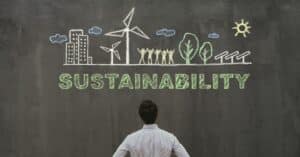We know there’s plenty we can do at home to reduce, reuse, and recycle but are Welsh businesses doing the same?
As the climate emergency heightens, it’ll become increasingly more important to build sustainability into business strategies. Otherwise, companies might find themselves overlooked for those who make environmentally friendly choices.
♻️Key Points:
- The Welsh Government has a plan in place to cut carbon emissions across the country and build a greener future, with its Net Zero Wales and Future Generations acts.
- Engineering and construction businesses in Wales are increasingly finding more ways to move towards greener processes, whilst still making a profit.
- Energy, manufacturing and transport are all sectors have opportunities to become more sustainable.
Why is it important to be sustainable?
It’s our duty to do our bit for the sake of the planet, whether it’s recycling our rubbish at home or making our workplaces greener.
The Welsh Government has a plan in place to cut carbon emissions across the country and build a greener future, with its Net Zero Wales and Future Generations acts.
By taking steps to become more sustainable in our daily lives, we can help to cut the harmful emissions that enter the atmosphere every day and conserve natural resources for the generations that follow us.
As governments, large organisations and other businesses all move towards sustainable processes, businesses will find themselves isolated if they don’t adopt greener ways of working.
According to 2021 research by Deloitte, over a third of consumers are choosing brands that have environmentally sustainable practices and values, so there’s no better time to show your customer base that you’re committed to making a difference.

Which sectors need to be more sustainable?
There are opportunities across all sectors to be more sustainable. But UK Environmental Accounts: 2021 show that the biggest polluting industries of 2019 were:
- Energy
- Manufacturing
- Transport
These sectors were also the biggest users of fossil fuels, along with households in the UK which also scored highly. Across all sectors, small businesses in the UK say they’re struggling with their sustainability plans, due to a lack of time and resources.
ACCA UK and the Corporate Finance Network which carried out the research have called on the government to provide more advice to small business owners on sustainability.
Which sectors are leading the way in sustainability?
In Wales, there are a number of notable sectors that are flying the flag for sustainability. Engineering and construction are increasingly finding more ways to move towards greener processes, with companies like Griffiths reducing their carbon emissions while still running a profitable business.
Aiming for an 80% reduction in carbon emission intensity by 2050, Griffiths is supporting local apprentices and communities while looking after the planet.
Tourism is another industry that’s leading the way in becoming more environmentally friendly. With lots of Destination Management Organisations focusing on the quality of visitors, over quantity, there’s currently a heavy focus on reducing litter and taking care of natural beauty.
The Green Key Wales is awarded to sustainable tourism providers so visitors can make an eco-friendly choice when they’re looking for somewhere to stay. One example is the Bryn Elltyd Eco Guest House in Snowdonia which is carbon neutral and runs on renewable energy, despite being built in the 1880s.
It goes to show that Welsh business owners really can make a significant difference with the right support behind them.

Welsh businesses doing sustainability well
With sustainability at their core, these Welsh businesses are creating products that are good for their customers and the planet.
TOTM
Aware of the dangers that period products can present to those who use them, TOTM (or Time of the Month) set out to create an eco-friendly brand that only uses organic cotton.
Made in the EU in a factory powered by renewable energy, the company is going the extra mile to support its customers by driving change in the industry. With 95% of their customers saying that making the switch to TOTM had a positive impact on their bodies and the environment, it’s clear TOTM is moving in the right direction.
DS Smith
Established in 1940 by two cousins, DS Smith has come a long way since it’s humble box-making days in East London.
Now a leading provider of sustainable packaging, recycling services, and paper products, DS Smith has laid out its eco-friendly plans for the next few years.
By 2025, they’re hoping to bring 1 billion pieces of problem plastics off supermarket shelves and optimise the use of fibre for individual supply chains in 100% of their new packaging solutions.
It’s also about engaging their people and communities. By 2030, they’re estimating they’ll have engaged 5 million young people on the circular economy.
Hiut Denim
Focusing on doing one thing and one thing only, Hiut Denim creates 200 pairs of quality jeans a week. Their focus is solely on making the best product they can make, rather than the most they can produce.
Based in Cardigan, Hiut encourage their customers to wash their jeans as little as possible to reduce the amount of water they use. Their No Wash Club even has a set of rules which includes no cold dips in the bath and no showers.
Saying no to anything that’s not jeans is their ethos – they want to pour all their efforts into making something of top quality that lasts a long time.
What can businesses do to become more sustainable?
There are plenty of ways for businesses to become more sustainable, including:
- Using greener materials in the manufacturing process
- Reusing waste, rather than throwing it away
- Increasing energy efficiency throughout production or in the office
- Introducing a circular economy where a product at the end of its life can be recycled and used for something new
- Taking IEMA environment sustainability courses to educate your team on the importance of sustainability







